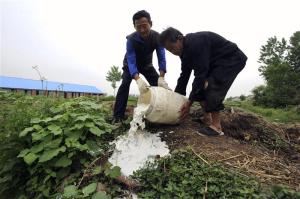
Dairy farmers discard fresh milk in China's Anhui province on May 14, 2009. (REUTERS/Jianan Yu)
As the National People’s Congress kicks off in Beijing, Chinese leaders’ priorities for the nation were rolled out over the weekend in the 11th five-year plan (2011-2015). Among those priorities, which include pledges to improve pollution, increase clean energy production and reduce the nation’s yawning wealth gap, is tackling the food safety problems that have plagued Chinese consumers, threatened Chinese exports and humiliated the government for the past three years.
On Thursday, NPC spokesman Zhao Qizheng announced that violators of China’s food safety laws will now face heavier punishment, including death. (Overall, the number of capital crimes was reduced from 68 to 55.) Ironically, Zhao also called on the press to help monitor the food safety chain going forward. We’ll assume he means the Chinese media – not the foreign reporters who are being tailed and beat up these days.
In November 2009, China executed two men for their roles in peddling melamine-tainted milk powder that resulted in the death of at least six infants and the sickening of 300,000 more the previous fall. The so-called melamine milk scandal led to the establishment of the national food safety commission. In 2009, the nation’s first comprehensive food safety law was also passed, but questions were immediately raised over whether the complicated reforms could be effectively implemented across China’s vast bureaucracy.
(See TIME’s top 10 product recalls.)
Indeed, the problems have continued. Last year, there were, according to the National Food Safety Regulating Work Office, at least 130,000 cases involving food safety issues and 248 arrests. Last week, I wrote about the revelation in a new, government backed study that at least 12 million tons of Chinese rice are likely to be contaminated with heavy metals, and there are more appetite-suppressing examples where that came from.
China’s leadership admitted over the weekend meetings that it is “very much embarrassed” by the nation’s track record. According to the Beijing Times, Vice Premier Wang Qishan said the laudable achievement of finally producing enough to feed China has become overshadowed by the quality of the food itself: “Just as we have enough food to eat, we have the food safety issue,” he said. Evidently, Beijing’s leadership is not, however, embarrassed to silence those calling for justice in the food chain’s corruption. Last fall, activist Zhao Lianhai was sentenced to 2.5 years in prison for organizing parents to call for greater compensation after their children were sickened in the milk scandal.
Perhaps the problem is more commercial than it is moral. Since the 2008 milk scandal, about half of China’s dairy and baby powder products are now imported. Whatever it is, it’s got the attention of those at the very top, and that can’t be a bad thing. According to the English daily South China Morning Post, Wang went on to tell the NPC that Premier Wen Jiabao himself had related a story to Wang indicative of how common it is for people to mistrust the food chain. While visiting Henan, and old woman offered the Premier peanuts – and told him not to worry about eating them, she had grown them herself.


